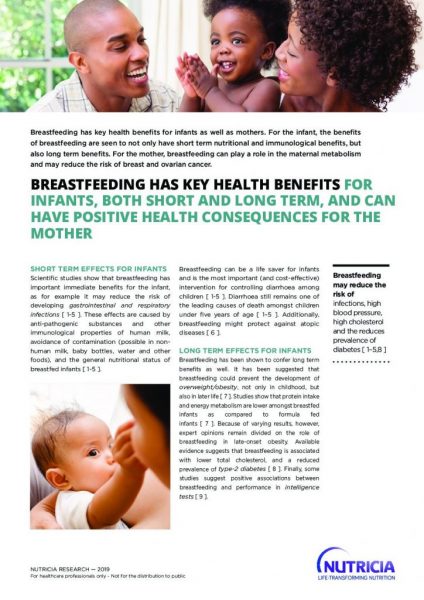The health benefits of breastfeeding for mothers and babies can’t be ignored. Babies go through a period of rapid growth and development in the first 1,000 days from conception. Research suggests that establishing good feeding habits and breastfeeding routines early on will help avoid some diseases later in life.
Short term effects for infants
Scientific studies show that breastfeeding from birth has important health benefits for babies. For example, it may reduce the risk of developing gastrointestinal and respiratory infections later in life1-5. Additionally, breastfeeding may protect against atopic diseases6.
Breast milk contains anti-pathogenic substances and other immunological properties, which helps aid general nutrition for infants. Breastfeeding also means in the early months mothers can avoid passing on possible contamination from non-human milk, baby bottles, water and other foods1-5.
Sometimes breastfeeding can be a life saver for babies in Africa. It is usually the most important (and cost-effective) intervention for controlling diarrhea amongst children1-5. Globally, diarrhea is still one of the leading causes of preventable death amongst children under five years of age1-5.
Long term effects for infants
Breastfeeding has been shown to pass on long term benefits as well. It has been suggested that breastfeeding could help prevent children from developing obesity, both in childhood and in later life7,8. Studies show that protein intake and energy metabolism are lower amongst breastfed infants compared to formula-fed infants7,8. Because of varying results, however, expert opinions remain divided on the role of breastfeeding and late-onset obesity. Available evidence suggests that breastfeeding is associated with lower total cholesterol and a reduced prevalence of type-2 diabetes9. Finally, some studies suggest positive associations between breastfeeding and performance in intelligence tests8,10.
Health consequences for mothers
Breastfeeding can also positively affect some aspects of maternal health. Studies show that breastfeeding reduces the risk of both breast and ovarian cancer11-13. Additionally, it may positively influence the mother’s metabolic health and reduce the risk of hypertension, hyperlipidemia and cardiovascular disease11,14.
Some studies suggest that breastfeeding has a role to play in helping control maternal weight15,16.
Another important aspect for maternal health, particularly from the perspective of developing countries in Africa and elsewhere, is lactational amenorrhea. Also known as postpartum infertility, this is the temporary postnatal infertility that occurs when a mother is breastfeeding. Breastfeeding following birth reduces the chance of getting pregnant again in the first six months17,18. Additionally, mental health may be positively influenced by breastfeeding, including reduced rates of postpartum depression19-21.

Publication: Breastfeeding has key health benefits
References
- Hörnell, Agneta, et al. “Breastfeeding, introduction of other foods and effects on health: a systematic literature review for the 5th Nordic Nutrition Recommendations.” Food & nutrition research 57.1 (2013): 20823.
- Lamberti, Laura M., et al. “Breastfeeding and the risk for diarrhea morbidity and mortality.” BMC public health 11.3 (2011): S15.
- Rebhan, Barbara, et al. “Breastfeeding duration and exclusivity associated with infants’ health and growth: data from a prospective cohort study in Bavaria, Germany.” Acta Paediatrica 98.6 (2009): 974-980.
- Agostoni, Carlo, et al. “Breast-feeding: a commentary by the ESPGHAN Committee on Nutrition.” Journal of pediatric gastroenterology and nutrition 49.1 (2009): 112-125.
- Michaelsen, Kim Fleischer. “Breastfeeding and the infant’s immune system.” Das Gesundheitswesen 70.S 1 (2008): S20-S21.
- World Health Organization. Report of the expert consultation of the optimal duration of exclusive breastfeeding, Geneva, Switzerland, 28-30 March 2001. No. WHO/NHD/01.09. Geneva: World Health Organization, 2001.
- Gluckman, Peter D., et al. “Effect of in utero and early-life conditions on adult health and disease.” New England Journal of Medicine 359.1 (2008): 61-73.
- Horta, Bernardo L., et al. “Evidence on the long-term effects of breastfeeding: systematic review and meta-analyses.” (2007).
- WHO. (2007) Implementing the Global Strategy for Infant and Young Child Feeding: Geneva,3-5 February 2003
- Victora, Cesar G., et al. “Association between breastfeeding and intelligence, educational attainment, and income at 30 years of age: a prospective birth cohort study from Brazil.” The Lancet Global Health 3.4 (2015): e199-e205
- Stuebe, Alison M., and Janet W. Rich-Edwards. “The reset hypothesis: lactation and maternal metabolism.” American journal of perinatology 26.01 (2009): 081-088.
- Beral, V., et al. “Collaborative Group on Hormonal Factors in Breast cancer: Breast cancer and abortion: collaborative reanalysis of data from 53 epidemiological studies, including 83000 women with breast cancer from 16 countries.” Lancet 363.9414 (2004): 1007-1016.
- Luan, Nan-Nan, et al. “Breastfeeding and ovarian cancer risk: a meta-analysis of epidemiologic studies.” The American journal of clinical nutrition 98.4 (2013): 1020-1031.
- Sankar, Mari Jeeva, et al. “Optimal breastfeeding practices and infant and child mortality: a systematic review and meta‐analysis.” Acta paediatrica 104 (2015): 3-13.
- Wiklund, Petri, et al. “Prolonged breast-feeding protects mothers from later-life obesity and related cardio-metabolic disorders.” Public health nutrition 15.1 (2012): 67-74.
- Kirkegaard, Helene, et al. “How do pregnancy-related weight changes and breastfeeding relate to maternal weight and BMI-adjusted waist circumference 7 y after delivery? Results from a path analysis.” The American journal of clinical nutrition 99.2 (2013): 312-319.
- WHO. (1998) Fertility and Sterility; 70(3): 461-71
- WHO. (1999) Fertility and Sterility; 72(3): 431-40
- Dias, Cláudia Castro, and Bárbara Figueiredo. “Breastfeeding and depression: a systematic review of the literature.” Journal of affective disorders 171 (2015): 142-154.
- Susman, Virginia L., and Jack L. Katz. “Weaning and depression: Another postpartum complication.” The American journal of psychiatry (1988).
- Brunton, P. J., J. A. Russell, and A. J. Douglas. “Adaptive responses of the maternal hypothalamic‐pituitary‐adrenal axis during pregnancy and lactation.” Journal of neuroendocrinology 20.6 (2008): 764-776.
BA19-485
